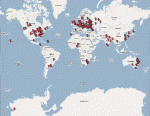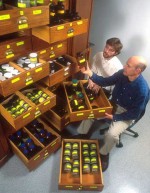Some of society's most important scientific questions have little to do with space travel, human disease, theoretical physics, or new math. Instead, they deal with issues such as the future of Earth's soil.
To promote and expand the world's long-term soil-research base, a workshop at Duke University and the Center for Environmental Farming Systems in North Carolina, USA, in December 2007 established a global network of long-term soil ecosystem (LTSE) studies, several of which have been in continuous operation since the 19th century. Participants at the workshop study soil and ecosystem change in Africa, Asia, Australia, Europe, and the Americas.
The workshop featured the proposition that soil studies spanning decades are key to answering some of the most significant questions faced by humanity today:
- Can soils more than double food production in the next few decades?
- How is soil interacting with the global carbon cycle and climate?
- How can land management minimize its adverse effects on the environment, and improve soil's processing of carbon, nutrients, wastes, toxics, and water?
Comprehensive research from long-term experiments provide direct observations of soil processes and changes that are evident only after years and decades. The data from these decadal experiments are invaluable for improving the quality of human life and that of the environment.
According to workshop organizer, Dr. Daniel Richter, a professor of soils and ecology at Duke, "Long-term records are key to predicting the weather, air pollution, river floods, and wildlife populations. Similarly, long-term soil observatories need explicit and much greater support not only to improve our rapidly intensifying management of land and water, but also to better manage environmental change."
During the workshop, new results were presented from long-term studies of soil fertility, chemical contamination, crop production increases and declines, greenhouse gas emissions, and water quality-all demonstrating and quantifying soils' susceptibility to change.
Dr. David Powlson of Rothamsted Research in the United Kingdom, a pioneer in long-term soil research, noted that there was great short-term potential for cross-site studies to advance the science of sustainability. Dr. Henry Janzen of the long-running Lethbridge field studies in Alberta, Canada, argued that new long-term studies are needed to meet the growing economic and environmental demands being placed on soils now and in the next few decades.
Participants were particularly concerned about crop declines observed in several long-term experiments. Research on intensively managed rice (an agro-ecosystem that currently feeds more than two billion people) indicates yield declines in several locations attributed to a variety of causes, some of which involve unexpected changes in the soil. More recent studies suggest that adverse climatic changes, such as an increase in night temperature, could be responsible for declining rice and wheat yields.
The participants also decried the poor funding support for long-term soil studies. Many such studies operate without stable institutional support and survive mainly due to the persistence of individual scientists. Several highly productive long-term experiments have been abandoned in recent years, including important studies in Africa and South America.
Currently the inventory includes a number of LTER and ILTER sites: Coweeta/USDA Forest Service; Andrews (the Detrital Input, Removal, and Transfer (DIRT) project); Konza; McMurdo; Sevilleta; Luquillo; and the Korean Long-term Ecological Research program at Mt. Jumbong.
The organizers have funding support for five yearly meetings from the National Science Foundation's Research Coordination Network Program and Critical Zone Exploratory Network, the United States Department of Agriculture, and Duke University.
An advanced-format website (http://ltse.env.duke.edu) supports the newly established network and connects more than 230 long-term studies with researchers, teachers, and students from around the world. This inventory is a community built (...opt in') list to which anyone (including the public) can post new LTSE sites. We encourage all LTSE studies to register their sites with us.

 Enlarge this image
Enlarge this image
